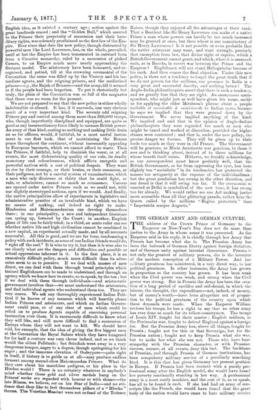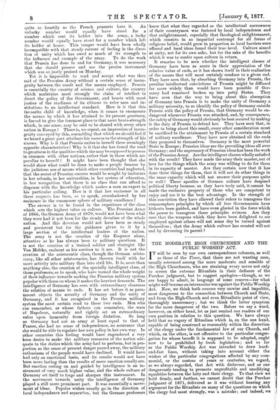THE GERMAN ARMY AND GERMAN CUL! UttE.
THE address of the Crown Prince of Germany to the Emperor on New-Year's Day does not do more than justice to the Army in whose name it was presented. As the Emperor said in his reply, it is chiefly through her Army that Prussia has become what she is. The Prussian Army has been the bulwark of German liberty against foreign dictation. and of German unity against internal dissensions. Prussia is not only the greatest of military powers, she is the inventor of the modern conception of a Military Power. And her military greatness has ministered, in a very direct way, to her political greatness. In other instances, the Army has grown in proportion as the country has grown. It has been weak when the Civil power was weak, and strong when the Civil power was strong. But in Prussia the Army has been the orea- tion of a long period of sacrifice and self-denial, in which the labour, the thought, the expenditure—not, indeed, of money, but of money's worth—have been altogether out of propor- tion to the political greatness of the country upon which these demands were made. When the Emperor William reviews his troops, he has a right to say that no other army has ever done so much for its fellow-countrymen. The troops of Louie XIV. fought for their master ; English soldiers, in the Peninsular war, fought to defend England against a foreign foe. But the Prussian Army has, above all things, fought for Prussia ; fought not for this or that Sovereign, but for the Prussian nation ; fought not to keep Prussia what she was, but to make her what she was not. Those who have least sympathy with the Prussian character, or with Prussian success, cannot, at all events, deny this fact. The backbone of Prussian, and through Prussia of German institutions, has been compulsory military service of a peculiarly searching kind. It is this that has given Germany her present position in Europe. If Prussia had been content with a purely pro- fessional army after the English model, she would have found her poverty continually standing in her way. A. professional army is a most costly machine, and the cost of it, so to speak, has all to be found in cash. If she had had an army of con- scripts like the French, she would have found that the great body of the nation would have come to hate military service
quite as heartily as the French peasants hate it. An unlucky number would equally have stood for a number which sent its holder into the army, a lucky number would equally have stood for a number which left its holder at home. This temper would have been wholly incompatible with that steady current of feeling in the direc- tion of unity which has owed so much of its strength to the influence and example of the army. To do the work that Prussia has done in and for Germany, it was necessary that she should possess and use the precise instrument which was so justly praised on Monday.
Yet it is impossible to read and accept what was then said of the Prussian Army without a certain sense of incon- gruity between the result and the means employed. Prussia is essentially the country of science and culture, the country which maintains most strongly the claim of intellect to direct the policy of the Government, and boasts with most justice of the readiness of its citizens to refer men and in- stitutions to an intellectual standard. How is it that this favourite child of knowledge, when it comes to enumerate the means by which it has attained to its present greatness, is forced to give the foremost place to that mere brute-strength which, in one sense, may be said to be shared with every other nation in Europe ? There is, we repeat, an impression of incon- gruity conveyed by this, resembling that which we should feel if we heard a great poet attribute his success to the strength of his sinews. Why is it that Prussia unites in herself these seemingly opposite characteristics? Why is it that she has found the road to greatness in the qualities which she may be supposed to possess in common with other nations, rather that in those which are peculiar to herself ? It might have been thought that she would show what could be done to make a people famous by the judicious use of means which other countries had neglected, that the secret of Prussian success would be sought by imitators in her schools, in her universities, in her system of education, in her recognition that there is no class that can afford to dispense with the knowledge which makes a man an expert in his particular calling. How is it that her eminence in all these respects has been, so to speak, overshadowed by her eminence in the commoner sphere of military excellence ?
The answer is to be found in the experience of the class which sets the highest value on culture. The Prussian Army of 1866, the German Army of 1870, would not have been what they were had it not been for the steady devotion of the whole nation. And this devotion would not have been so steady and persistent but for the guidance given to it by a large section of the intellectual leaders of the nation. The army is not the creation of the Emperor alone, attentive as he has always been to military questions. It is not the creation of a trained soldier and strategist like Von Moltke, eminent as his services to it are. It is not the creation of the aristocratic class, though the German aristo- cracy, like all other aristocracies, has thrown itself with far more activity into military than into civil life. It is, more than anything else, the creation of the specially intelligent class, of those professors, so to speak, who have turned the whole weight of their influence towards making the Prussian military system popular with those on whom it makes the heaviest demands. The intelligence of Germany has seen with extraordinary clearness the relation of means to ends. It has set before it as para- mount objects the security of Germany and the unity of Germany, and it has recognised in the Prussian military System the most certain road to these two ends. Men who can remember, or whose fathers can remember, the wars of Napoleon, naturally and rightly set an extraordinary value upon immunity from foreign dictation. So long as Germany had not an army at least equal to that of France, she had no sense of independence, no assurance that she would be able to regulate her own policy in her own way. In other countries this feeling would have engendered a very keen desire to make the military resources of the nation ade- quate to the duties which the army had to perform, but in pro- portion as the sense of present danger passed away, the military enthusiasm of the people would have declined. It would have had only an emotional basis, and its results would not have been more lasting than the results of mere emotion usually are. But emotion resting on and guided by intelligence is an in- strument of very much higher value, and the whole culture of Germany set itself to forge and sharpen this instrument. In the movement towards unity the intelligence of Germany played a still more prominent part. It was essentially a move- ment of ideas. Popular wishes usually go in the direction of local independence and separation, but the German professors
knew that what they regarded as the intellectual narrowness of their countrymen was fostered by local independence and that enlightenment, especially that theological enlightenment, which consists in an impartial contempt for all forms of religious belief, would grow in proportion as local barriers were effaced and local ideas found their true level. Culture aimed at unity, not for its own sake, but for the sake of the benefits which it was to confer upon culture in return.
It remains to be seen whether the intelligent classes of Germany have been as acute in their appreciation of the relative value of ends, as it has shown itself in their realisation of the means that will most certainly conduce to a given end. They have seen that, by absorbing Germany into Prussia, the peculiar intellectual convictions of Prussia might be diffused far more widely than would have been possible if Ger- many had remained broken up into petty States. They have seen that the way to bring about this absorption of Germany into Prussia is to make the unity of Germany a military necessity, to so identify the policy of Germany outside Prussia with the policy of Prussia, that Germany would be en- dangered whenever Prussia was attacked, and, by consequence, the safety of Germany would obviously be best secured by making it the duty of Prussia to defend her. They have seen that, in order to bring about this result, every other consideration must be sacrificed to the attainment by Prussia of a certain standard of military excellence. They have now obtained all the ends they proposed to themselves. Germany is the most powerful State in Europe; Prussian ideas are the prevailing ideas all over Germany; and the supremacy of Prussian ideas has been the work of the Prussian Army. Are the intelligent classes wholly satisfied with the result? They have made the army their master, out of love for the things which the army was willing to do for them in its capacity of master. Are they certain now that it has done these things for them, that it will not do other things in the same capacity which will not answer their purposes quite so well ? These apostles of German culture have despised political liberty because, as they have truly said, it cannot be made the exclusive property of those who are competent to enjoy and use it to the best advantage. In the strength of this conviction they have allowed their rulers to transgress the commonplace principles by which all free Governments have hitherto been guided, and have even gloried in the force which the power to transgress these principles evinces. Are they sure that the weapons which they have been delighted to see employed against others will not some day be turned against themselves ; that the Army which culture has created will not end by devouring its parent ?










































 Previous page
Previous page